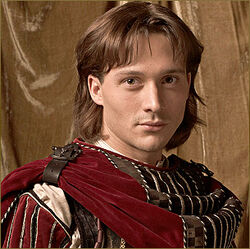| Giovanni "Juan" Borgia | |
|---|---|

| |
| Biographical information | |
| Born |
1476 |
| Died |
14 June 1497 (aged 21) |
| Time period |
Italian Renaissance |
| Political information | |
| Affiliations |
House of Borgia |
| Actor |
David Oakes |
Juan Borgia is the middle son to Rodrigo Borgia and Vanozza Dei Cattenei. He is a younger brother to Cesare Borgia and an elder brother to Joffre Borgia and Lucrezia Borgia. He is Gonfaloniere and Captain General of the Church, both positions his brother Cesare wanted.
Upon his father's becoming Pope, Juan is bestowed the title of Duke of Gandia and head of the Papal Army. His relationship with his siblings, specifically Cesare and Lucrezia, escalates from rivalry for their father's affection to hostility over the protection of the family. Juan suffers from inverted snobbery; although a bastard with a common-born mother, he abhors his blood ties with the peasantry and treats them with great harshness, including assaulting his mother's former husband who is also of the peasantry class.
Juan's fighting skills and arrogance at being a military commander belies his incompetence at actual command; his first real attempt at battle is against the French King Charles VIII, who decimates Juan's army with one barrage from his cannons. This is a source of constant frustration for his brother Cesare, who is much more intelligent and authoritative despite his position as a cleric, which Juan often mocks him for. Although Juan is initially able to outclass his brother easily in swordfighting and riding, Cesare's time spent with Micheletto eventually makes him equal to Juan in these categories by early Season Two.
The conflict between Lucrezia and Juan reaches violence when Juan murders Lucrezia's fleeing lover Paolo, who is the father to her child, Giovanni. Though Juan attempts to disguise the murder as a suicide, Lucrezia uncovers the falsified suicide note that the illiterate Paolo was incapable of writing. Lucrezia attempts to murder or maim Juan by dropping a chandelier on him and his lover.
Attempting to diffuse the situation, Alexander orders Juan to go to Spain and learn some dignity and chivalry from his cousins, so that he might "become the Borgia he was always meant to be". Eventually, Juan chooses a bride from his father's options, María de Luna, in order to strengthen political ties with Spain. He travels with the Conquistadores for a time in the Americas, eventually returning to Rome in a triumphal procession. His feud with Cesare and Lucrezia, however, remains strong, despite an initially warm reunion. Juan boasts to his father that his wife is pregnant with a son. In private, however, he suffers from an unspecified venereal disease (most probably syphilis), which his physician instructs him to medicate with mercury and opium; Juan soon becomes addicted to the latter, frequently visiting a Muslim-owned opium den.
Juan then leads an unsuccessful campaign against Catrina Sforza's stronghold at Forli. Attempting to press Catrina to submission by torturing her captured son, Benito Sforza, Juan is infuriated by her continued defiance and insults. He then orders that Benito be hanged, but Catherina's cousin Ludovico Il Moro Sforza, Duke of Milan, arrives and launches a counterattack on the Papal armies with his own forces. Juan is severely injured by a crossbow bolt to the leg and makes a cowardly flight back to Rome, leaving his crippled army to make its' own retreat. When Juan returns to the Vatican, he lies about the circumstances of his survival and says that Benito had been killed. Cesare discovers the truth of the battle from the rescued Benito and tells the Pope. After several heated confrontation with Lucrezia in which he drunkenly endangers the life of Giovanni, Juan is finally murdered by Cesare with the assistance of Micheletto. Alexander is devastated by his son's death, but is eventually able to accept that his middle son was unfit for leadership- Alexander had continually placed the positions of military and noble authority upon Juan rather than the more capable Cesare because he saw Cesare as too much like himself.